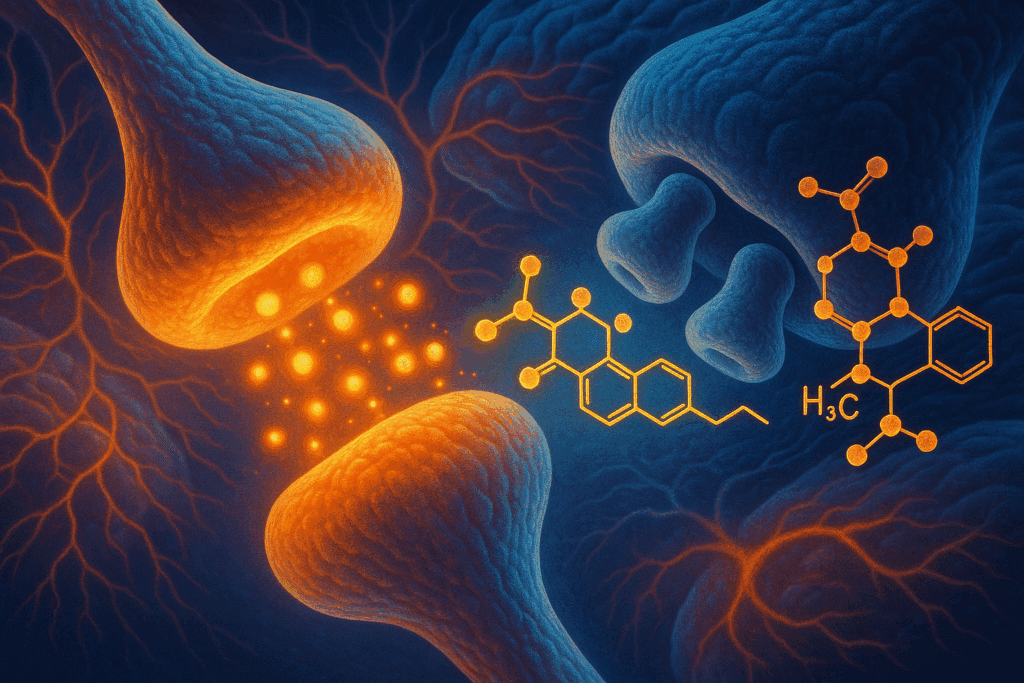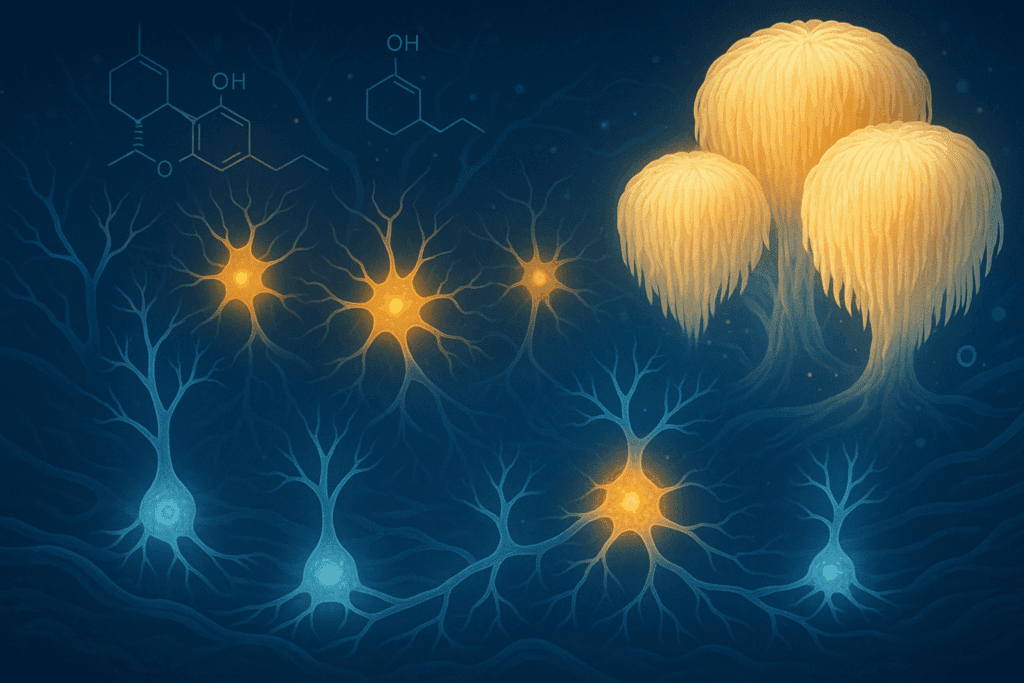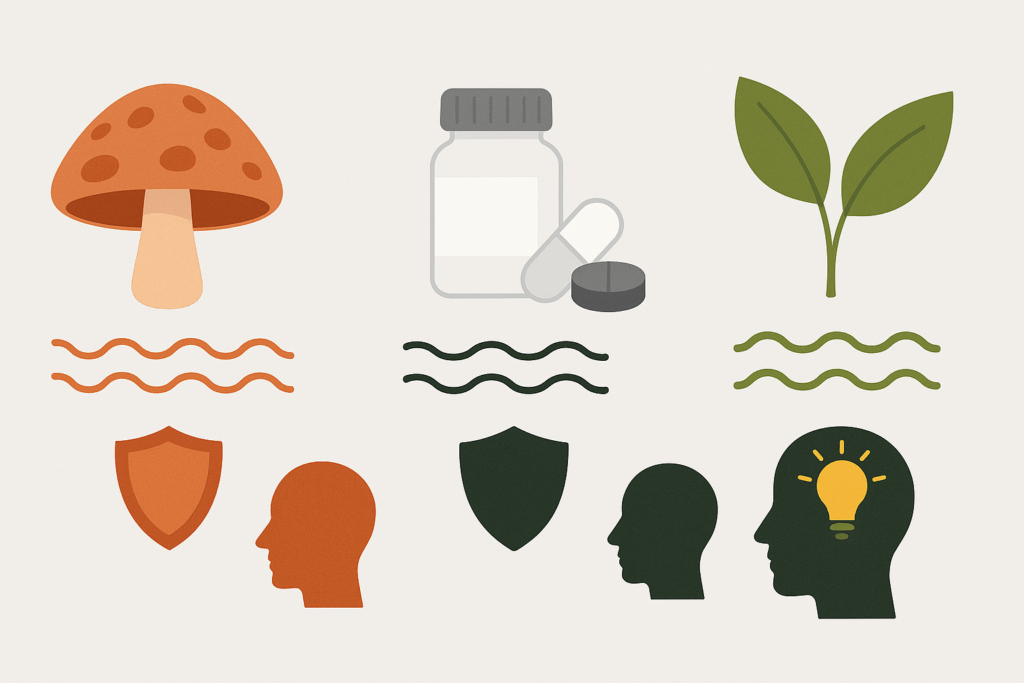Introduction: Exploring the Intersection of Nootropic Mushrooms and Cognitive Enhancement
In recent years, the pursuit of natural solutions for cognitive enhancement has led to a surge of interest in the therapeutic potential of nootropic compounds. Among these, a new frontier has emerged at the intersection of functional mushrooms and cannabinoid derivatives: delta 8 shrooms. As scientific exploration into nootropics expands, so too does public curiosity about how substances like delta 8 THC, when combined with specific mushroom strains, might impact memory, focus, and overall cognitive performance. The concept of delta 8 shrooms synthesizes two powerful forces—psychoactive cannabinoids and adaptogenic fungi—into a novel supplement that promises benefits for mental clarity and neural resilience. This article investigates the cognitive implications of delta 8 mushrooms, examining both the emerging science and the anecdotal narratives that fuel their rising popularity.
While delta 8 THC is a lesser-known cannabinoid with a milder psychoactive profile than its delta 9 counterpart, it shares many neurochemical pathways that influence mood, memory, and perception. When infused into or consumed alongside functional or psychedelic mushrooms, the resulting synergy offers a multifaceted approach to enhancing cognitive function. This article will explore the mechanisms behind delta 8 shrooms, their potential nootropic benefits, their safety profile, and how they compare to other brain-boosting substances. In doing so, we aim to provide a clear, comprehensive, and evidence-based understanding for readers seeking to optimize their mental acuity through natural and innovative means.
You may also like: The Ultimate Guide to the Best Nootropic Mushrooms for Memory and Cognitive Enhancement

Understanding Delta 8 THC and Its Neurological Effects
Delta 8 THC, short for delta-8-tetrahydrocannabinol, is a cannabinoid derived from hemp that has gained traction for its gentle psychoactive effects. Unlike delta 9 THC, which is the primary intoxicating compound in cannabis, delta 8 offers a more subdued experience, often described as clear-headed and focused. This distinction is critical in the context of cognitive enhancement, as delta 8 users typically report minimal disruption to executive functions such as memory retention and decision-making.
The endocannabinoid system (ECS) plays a central role in how delta 8 THC influences the brain. This system is composed of receptors (primarily CB1 and CB2), endocannabinoids, and enzymes responsible for neurotransmitter balance. Delta 8 binds preferentially to CB1 receptors located in the central nervous system, albeit with lower affinity than delta 9, resulting in less potent psychotropic effects. This binding is associated with the modulation of neurotransmitters such as dopamine, serotonin, and acetylcholine—chemicals integral to mood regulation, learning, and memory consolidation.
Beyond subjective reports of increased focus and calm, preliminary research into delta 8 THC has indicated anti-anxiety, analgesic, and neuroprotective properties. These qualities make it an appealing candidate for those seeking gentle cognitive stimulation without the jitteriness or overstimulation often associated with synthetic nootropics. As interest in delta 8 mushrooms grows, understanding the cannabinoid’s standalone properties is essential to appreciating how it might enhance the effects of medicinal mushrooms.

The Functional Power of Nootropic Mushrooms
Mushrooms have long been revered for their medicinal properties, particularly in traditional Eastern medicine. In the modern context, nootropic mushrooms such as Lion’s Mane (Hericium erinaceus), Reishi (Ganoderma lucidum), and Cordyceps (Cordyceps militaris) have become focal points of scientific study for their ability to support cognitive health. These fungi exert their effects through various mechanisms, including promoting neurogenesis, reducing inflammation, and enhancing mitochondrial efficiency.
Lion’s Mane, in particular, has demonstrated the ability to stimulate nerve growth factor (NGF), a protein vital for the survival and growth of neurons. Increased NGF expression is associated with improved memory, faster learning, and resilience against neurodegenerative diseases such as Alzheimer’s. Cordyceps is known for its role in ATP production, which can support mental stamina and alertness. Reishi, often dubbed the “mushroom of immortality,” provides neuroprotective antioxidants and supports a balanced stress response, helping the brain recover from oxidative damage and emotional fatigue.
The adaptogenic nature of these mushrooms allows them to modulate the body’s stress response while enhancing mental clarity and focus. Their integration into wellness routines is often aimed at long-term brain health rather than acute stimulation. When combined with delta 8 THC, however, the effects may be amplified or complemented in ways that heighten both immediate cognitive performance and long-term neuroplasticity.
Delta 8 Shrooms: A Synergistic Approach to Brain Health
The term “delta 8 shrooms” refers to products or formulations that combine delta 8 THC with medicinal or psychedelic mushrooms. These formulations aim to harness the complementary effects of both substances to provide a holistic cognitive boost. While still a relatively new category in the nootropic landscape, delta 8 shrooms are gaining traction due to their unique capacity to enhance focus, memory, and creativity without causing significant impairment or anxiety.
The synergy between cannabinoids and mushrooms lies in their interaction with the brain’s signaling pathways. Delta 8 may enhance the absorption or efficacy of mushroom-derived compounds like hericenones and erinacines (found in Lion’s Mane), creating a neurochemical environment conducive to learning and neural regeneration. Meanwhile, the mushrooms may buffer some of the psychoactive effects of delta 8, grounding the user in a more stable cognitive state.
Users of delta 8 mushrooms often report experiences characterized by heightened sensory awareness, improved task engagement, and deeper emotional introspection. These qualities align with enhanced cognitive flexibility—the brain’s ability to switch between tasks or perspectives efficiently. While more empirical research is needed, early anecdotal evidence and consumer trends suggest that delta 8 shrooms could be a powerful tool for those seeking natural cognitive enhancers.

The Role of Delta 8 Mushroom Gummies in Cognitive Support
Among the most accessible forms of delta 8 shrooms are delta 8 mushroom gummies. These edibles offer a convenient and discreet method of consumption while allowing for precise dosage control. Gummies typically blend delta 8 distillate with extracts from nootropic mushrooms like Lion’s Mane or Cordyceps, delivering a palatable supplement that fits easily into daily routines.
The slow digestion and absorption of gummies allow for a gradual onset of effects, which can be beneficial for maintaining consistent mental energy throughout the day. Unlike energy drinks or caffeine pills that spike and crash, delta 8 mushroom gummies tend to promote a sustained sense of clarity and calm. This makes them ideal for tasks that require prolonged concentration, such as studying, writing, or project planning.
Furthermore, these gummies often include complementary ingredients such as vitamin B12, L-theanine, or Rhodiola rosea, which can further support neurotransmitter balance and resilience against cognitive fatigue. For college students, professionals, and creatives alike, delta 8 mushroom gummies represent a promising alternative to traditional stimulants that may carry higher risks or side effects.
Neurogenesis and the Brain-Boosting Potential of Delta Mushrooms
Delta mushrooms, when infused with cannabinoids like delta 8, may support one of the brain’s most essential functions: neurogenesis. This process—the formation of new neurons—primarily occurs in the hippocampus, a region critical for memory formation and emotional regulation. Both delta 8 THC and certain mushroom compounds have shown the potential to encourage this regenerative activity.
Lion’s Mane mushroom, a staple ingredient in many delta mushroom products, is one of the few known natural substances capable of stimulating NGF production. This has significant implications for neuroplasticity, or the brain’s ability to adapt and reorganize itself. When paired with delta 8, which modulates neurotransmitter release and may reduce inflammation, the combined effects could amplify neuronal growth and synaptic communication.
This regenerative potential is especially relevant in contexts of cognitive decline, traumatic brain injury, or chronic stress—all of which can impair memory and executive functioning. By supporting neurogenesis, delta 8 shrooms may not only enhance immediate mental performance but also contribute to long-term brain health and resilience against age-related decline. More clinical studies are needed to confirm these benefits, but the foundational science offers a compelling rationale for further exploration.
Emotional Resilience and Stress Modulation with Delta 8 Shrooms
Cognitive performance is inextricably linked to emotional well-being. Stress, anxiety, and emotional dysregulation can impair attention, decision-making, and memory consolidation. One of the most promising aspects of delta 8 shrooms is their potential to modulate the brain’s stress response while enhancing mental clarity.
Delta 8 THC is well known for its anxiolytic properties, meaning it can reduce feelings of anxiety and unease. This is particularly beneficial when engaging in cognitively demanding tasks that may otherwise trigger stress-related impairments. The inclusion of mushrooms like Reishi or Chaga, both of which support the parasympathetic nervous system, enhances this calming effect and promotes a balanced mood.
By fostering a sense of calm focus, delta 8 shrooms allow users to operate in a mental state that is both relaxed and alert—a psychological sweet spot for optimal performance. This balance can improve test-taking ability, creative problem-solving, and the capacity to remain composed in high-pressure environments. For individuals struggling with chronic stress or cognitive burnout, delta 8 shrooms may provide a gentle yet effective path to renewed mental vitality.

Delta 8 Shrooms and the Science of Flow States
One of the most coveted cognitive states is the elusive “flow”—a condition of heightened focus, seamless action, and deep immersion in the task at hand. Achieving flow requires the harmonious alignment of attention, motivation, and cognitive resources. Delta 8 shrooms may offer a unique pathway to accessing this state more readily and reliably.
The psychoactive but non-overwhelming nature of delta 8 allows for a degree of cognitive stimulation without the chaos or paranoia that stronger cannabinoids can induce. Meanwhile, the neurotrophic compounds in mushrooms may enhance connectivity between brain regions responsible for attention, pattern recognition, and executive control. Together, these effects can prime the brain for flow by reducing internal distractions and increasing task engagement.
Many users of delta 8 mushroom products describe entering states of deep concentration during activities such as writing, painting, or coding—anecdotal evidence that aligns with flow theory. While the neuroscience of flow is still developing, the role of dopamine, endorphins, and neuroplasticity are well established. Delta 8 shrooms appear to support all three, offering a powerful natural supplement for peak cognitive experiences.
Practical Considerations: Dosage, Safety, and Legal Landscape
As with any supplement or psychoactive substance, the responsible use of delta 8 shrooms is paramount. While generally considered safe when used appropriately, both delta 8 THC and mushroom compounds can have potent effects that vary based on dosage, individual sensitivity, and product formulation. Understanding these variables is essential for maximizing benefits while minimizing risks.
A typical starting dose of delta 8 THC ranges between 5 and 10 milligrams, with higher doses potentially leading to drowsiness or mild intoxication. When paired with nootropic mushrooms, especially those with adaptogenic or psychoactive properties, it’s wise to begin with the lowest effective dose and gradually adjust. Consulting a healthcare professional, particularly for individuals with pre-existing conditions or those taking medications, is strongly advised.
Legally, delta 8 THC occupies a gray area. While federally legal under the 2018 Farm Bill if derived from hemp, some states have banned or restricted its sale. The legal status of medicinal and psychedelic mushrooms also varies widely. Consumers should familiarize themselves with local laws and ensure that any delta 8 mushroom products they use are lab-tested for purity and potency. Reputable brands will provide certificates of analysis and transparent sourcing practices.

Navigating the Long-Term Effects of Delta 8 Shrooms on Brain Plasticity
One of the most intriguing aspects of delta 8 shrooms lies in their potential impact on brain plasticity, the ability of neural networks to adapt and reorganize in response to experiences. Neuroplasticity is not just a buzzword in modern neuroscience—it is the foundation of learning, recovery, and adaptability throughout life. While much research has focused on traditional nootropics and their influence on synaptic plasticity, emerging studies and user experiences suggest that delta 8 shrooms may also contribute meaningfully to this dynamic process.
Lion’s Mane mushrooms, a frequent component of delta 8 shrooms, have been shown in several animal and in-vitro studies to upregulate NGF, a protein critical for maintaining and developing synaptic connections. Meanwhile, delta 8’s modulation of neurotransmitters such as acetylcholine, glutamate, and dopamine can enhance synaptic efficiency and cognitive receptivity. When used regularly—but not excessively—delta 8 mushrooms may promote enhanced learning potential by maintaining an optimal neural environment for growth and connection.
Furthermore, emotional and psychological flexibility, a less frequently discussed aspect of brain plasticity, may also benefit from these compounds. Anecdotal reports and preliminary findings hint that delta 8 shrooms can support emotional regulation and open-mindedness by enhancing default mode network (DMN) modulation. The DMN is associated with self-referential thought and mind-wandering, and its optimal function has been linked to creativity, empathy, and introspection. Thus, delta 8 shrooms could help users process experiences more fluidly and build psychological resilience in an increasingly demanding world.
Enhancing Creative Thought and Problem-Solving with Delta 8 Shrooms
Creativity often emerges from the convergence of spontaneous ideation and disciplined focus. It is this balance that many nootropics attempt to foster—though few achieve it as organically as delta 8 shrooms seem to. Reports from artists, writers, and entrepreneurs describe experiences of mental clarity combined with a reduction in internal noise, allowing for innovative thinking and productive flow. These effects may stem from delta 8 THC’s ability to elevate dopamine levels, a neurotransmitter associated with reward, motivation, and divergent thinking.
In addition to dopamine, delta 8 also appears to influence serotonin pathways, which play a crucial role in mood and cognitive flexibility. When paired with neurotrophic mushroom compounds, this modulation can shift thought patterns away from rigid, linear constructs and toward more abstract, associative modes of thinking. This is particularly valuable in fields that demand creative problem-solving and the generation of novel ideas. Users often report that their mental environment feels “uncluttered,” with ideas surfacing more freely and connections forming more intuitively.
Moreover, the reduction in performance anxiety associated with delta 8’s calming properties can make users more willing to explore unconventional solutions and embrace risk-taking in intellectual pursuits. Whether drafting a new business proposal or composing a musical piece, delta 8 shrooms may serve as a cognitive lubricant that smooths the transition from conception to execution. For those seeking a reliable supplement to enhance the creative process without cognitive overload, delta 8 mushrooms offer a compelling and increasingly popular solution.

Addressing Cognitive Fatigue and Burnout with Delta 8 Mushrooms
Modern lifestyles are often characterized by mental overexertion and insufficient rest, a combination that contributes to widespread cognitive fatigue and burnout. In these contexts, the appeal of delta 8 mushrooms becomes particularly salient. Unlike harsh stimulants that mask fatigue while exacerbating stress on the nervous system, delta 8 shrooms work by modulating both excitatory and inhibitory pathways to restore cognitive balance.
Delta 8 THC’s interaction with the endocannabinoid system helps regulate stress hormones like cortisol, often implicated in the depletion of cognitive resources. When cortisol levels remain elevated, the hippocampus—a brain region responsible for memory consolidation—can suffer structural and functional impairments. Delta 8’s mild anxiolytic effects, therefore, play a preventative role, safeguarding memory and focus under pressure. Simultaneously, mushrooms like Cordyceps and Reishi support adrenal health and mitochondrial efficiency, countering the physical manifestations of mental fatigue.
This dual action creates a replenishing effect that distinguishes delta 8 shrooms from synthetic nootropics. Users frequently report a sense of mental “reset” after dosing—one that combines calmness with restored alertness. This makes delta 8 mushroom gummies a potential ally not only for acute bouts of fatigue but also for maintaining long-term cognitive stamina. With continued responsible use, they may help recalibrate the mind-body interface, allowing individuals to navigate high-demand environments without succumbing to burnout.

Comparing Delta 8 Shrooms with Other Nootropic Agents
In the crowded field of cognitive enhancers, delta 8 shrooms offer a distinct profile that sets them apart from both synthetic nootropics and other natural supplements. Synthetic compounds like modafinil or racetams, while effective, often carry the risk of dependency or undesirable side effects. Natural options such as ginkgo biloba or omega-3 fatty acids tend to be safer but may lack the immediate potency desired by some users.
Delta 8 mushrooms strike a balance between these extremes. Their combination of mild euphoria, neuroprotection, and adaptogenic support makes them versatile tools for cognitive enhancement without the drawbacks of overstimulation or habituation. Moreover, the customizable nature of delta 8 mushroom gummies allows users to tailor their experience according to their specific cognitive needs.
When compared to traditional cannabis products, delta 8 shrooms offer a more manageable and functional high, making them suitable for daytime use or professional environments. Unlike caffeine or nicotine, which can cause energy crashes or withdrawal symptoms, delta 8 and mushrooms promote a smoother, more sustainable mental boost. For those seeking an integrative, brain-friendly approach to peak performance, delta 8 shrooms may represent the next evolution in nootropic supplementation.
FAQ :: Practical Insights into Delta 8 Shrooms for Cognitive Health
1. What makes delta 8 shrooms different from traditional nootropics?
Delta 8 shrooms differ from traditional nootropics in their dual-action mechanism—combining the mild euphoria and neurochemical modulation of delta 8 THC with the adaptogenic and neurotrophic properties of functional mushrooms. While many nootropics target specific cognitive domains like memory or focus through synthetic means, delta 8 mushrooms offer a more holistic approach by reducing anxiety and supporting long-term neural regeneration. This natural synergy can improve both executive function and emotional resilience. Users often report enhanced creativity, motivation, and learning speed, which are less commonly associated with single-agent nootropics. Moreover, delta 8 shrooms are less likely to cause overstimulation, making them suitable for daily cognitive support without the jittery side effects.
2. How do delta 8 mushroom gummies fit into a wellness routine?
Delta 8 mushroom gummies are particularly appealing for users looking to incorporate cognitive-enhancing supplements into a structured wellness regimen. Their measured dosage and ease of consumption make them ideal for morning routines, midday productivity boosts, or even pre-workout focus enhancement. When taken consistently, they can provide a subtle uplift in mental clarity without disrupting the body’s natural rhythms. Some users also stack them with other health-promoting practices like journaling or breathwork to amplify results. Because the gummies are metabolized slowly, their effects are sustained, allowing for enhanced attention and mood throughout the day.
3. Can delta 8 mushrooms support emotional processing and therapeutic growth?
Yes, delta 8 mushrooms have shown promise in supporting emotional introspection and therapeutic breakthroughs, particularly in low-to-moderate doses. By easing anxiety and fostering a state of gentle mental openness, they create an environment conducive to self-reflection. This can be especially beneficial when paired with therapy, mindfulness practices, or emotional journaling. Functional mushrooms like Reishi or Lion’s Mane can help stabilize emotional states, while delta 8 contributes to a more relaxed, grounded experience. As a result, users may find it easier to address emotional blockages or reframe traumatic memories in a safe, supported mental state.
4. What are the lesser-known benefits of delta mushrooms in brain recovery?
Beyond neurogenesis, delta mushrooms may support brain recovery from injuries, chronic stress, or inflammatory conditions. Their anti-inflammatory properties can reduce cytokine activity in the brain, helping restore normal function after trauma. Additionally, some studies suggest that the polysaccharides found in mushrooms enhance glial cell health, crucial for maintaining optimal brain homeostasis. When combined with delta 8 THC’s antioxidant and calming effects, this blend becomes particularly suited for post-exertion mental fatigue or recovery after emotional overload. Long-term users often report better mental stamina and fewer cognitive crashes following high-stress periods.
5. How can delta 8 shrooms influence social cognition and communication?
Delta 8 shrooms may enhance aspects of social cognition such as empathy, verbal fluency, and emotional attunement. These effects are largely attributed to delta 8’s influence on dopamine and oxytocin pathways, which govern social bonding and communication. At the same time, the adaptogenic elements of mushrooms help stabilize mood, making users more receptive and emotionally intelligent during interpersonal exchanges. This makes delta 8 shrooms potentially useful for social anxiety, performance situations, or conflict resolution. Some individuals even use them intentionally before networking events or public speaking engagements to foster confidence and connection.
6. What are the most effective ways to enhance the bioavailability of delta 8 shrooms?
Enhancing bioavailability ensures that users receive the maximum cognitive and therapeutic benefits from delta 8 shrooms. Consuming these compounds with healthy fats—such as avocado or coconut oil—can increase cannabinoid absorption due to their lipophilic nature. Some users also incorporate piperine (from black pepper) or quercetin, which may inhibit metabolic enzymes and extend the active window. Sublingual tinctures, when available, bypass the digestive tract for more rapid onset. Lastly, mindful timing—such as taking delta 8 mushrooms during a relaxed state or post-meal—can support better absorption and more balanced effects.
7. Are there any known interactions between delta 8 shrooms and common medications?
Yes, delta 8 shrooms may interact with medications that affect serotonin, dopamine, or liver enzymes such as CYP3A4 and CYP2C9. This includes antidepressants, antipsychotics, and some blood pressure or antiepileptic medications. Because both delta 8 THC and mushroom extracts can affect neurotransmitter systems and metabolism, combining them with pharmaceuticals could potentiate or interfere with drug actions. For example, combining delta 8 mushrooms with SSRIs might amplify serotonergic effects, leading to unintended consequences. It is strongly advised to consult a healthcare professional before incorporating delta 8 mushroom gummies or any related supplements alongside prescribed medications.
8. How might delta 8 mushroom gummies affect sleep patterns and circadian rhythms?
Depending on timing and dosage, delta 8 mushroom gummies can either support restful sleep or promote gentle wakefulness. Taken in the evening, the calming properties of delta 8 combined with Reishi or other sedating mushrooms may facilitate relaxation and deeper REM cycles. When consumed in the morning, however, formulations with Cordyceps or Lion’s Mane might boost energy without causing overstimulation. Some users report vivid dreams or increased dream recall, possibly due to heightened serotonin and acetylcholine activity. As with any cognitive enhancer, consistency and routine are key to maintaining healthy circadian alignment.
9. What innovations are emerging in the delta mushrooms supplement space?
The delta mushrooms industry is rapidly evolving, with innovations focused on personalization, precision dosing, and synergistic blends. Companies are beginning to tailor formulations for specific cognitive outcomes—such as creativity, resilience, or neuroprotection—using advanced extraction methods and microencapsulation. There is also increasing interest in combining delta 8 with other cannabinoids like CBG or CBD for a more balanced effect profile. Some brands are exploring time-release delivery systems in delta 8 mushroom gummies to extend cognitive benefits across multiple hours. These developments reflect a growing sophistication in consumer preferences and scientific formulation.
10. What is the long-term outlook for delta 8 shrooms in cognitive enhancement research?
The future of delta 8 shrooms in cognitive research appears promising, though much of the current evidence remains anecdotal. As interest in natural nootropics grows, researchers are beginning to explore the potential of combining cannabinoids with neurotrophic fungi in clinical settings. Key areas of investigation include their impact on neuroplasticity, stress resilience, and even age-related cognitive decline. Moreover, public demand for transparent, lab-tested, and evidence-backed formulations is driving higher quality standards in the industry. With regulatory clarity and scientific momentum, delta 8 shrooms could play a foundational role in the next generation of integrative cognitive health solutions.
Conclusion: Embracing the Cognitive Potential of Delta 8 Mushrooms
The emergence of delta 8 shrooms as a tool for enhanced memory and focus represents a significant development in the world of cognitive health. By merging the neurological benefits of cannabinoids with the adaptogenic and neurotrophic power of mushrooms, these compounds create a synergistic effect that supports both immediate cognitive performance and long-term brain resilience. As our understanding of neurobiology deepens, it becomes increasingly clear that complex, multidimensional interventions like delta 8 mushrooms may hold the key to unlocking higher states of mental clarity, creativity, and emotional balance.
From delta 8 mushroom gummies that support sustained focus, to full-spectrum formulations targeting neurogenesis and stress reduction, the possibilities are both exciting and profound. For students, professionals, and lifelong learners alike, the gentle yet powerful effects of delta mushrooms offer a natural alternative to harsher stimulants and synthetic cognitive enhancers. While more research is necessary to fully elucidate their mechanisms and long-term impact, the current body of evidence—both scientific and experiential—suggests that delta 8 shrooms are more than just a passing trend. They are part of a broader movement toward integrative cognitive wellness that respects both the complexity of the brain and the potential of nature.
As interest continues to grow, it is crucial to prioritize safety, education, and responsible use. By understanding the science behind these compounds and choosing high-quality, lab-tested products, individuals can harness the full potential of delta 8 mushrooms for enhanced memory, improved focus, and overall mental well-being. The future of nootropics is evolving—and delta 8 shrooms may be at the forefront of this transformative shift.
Further Reading :
Shaka Sweets Magic Mushroom Gummies
Mushroom Gummies vs Delta 8: What’s The Difference?
Mushroom edibles are making people sick. Scientists still don’t know why
